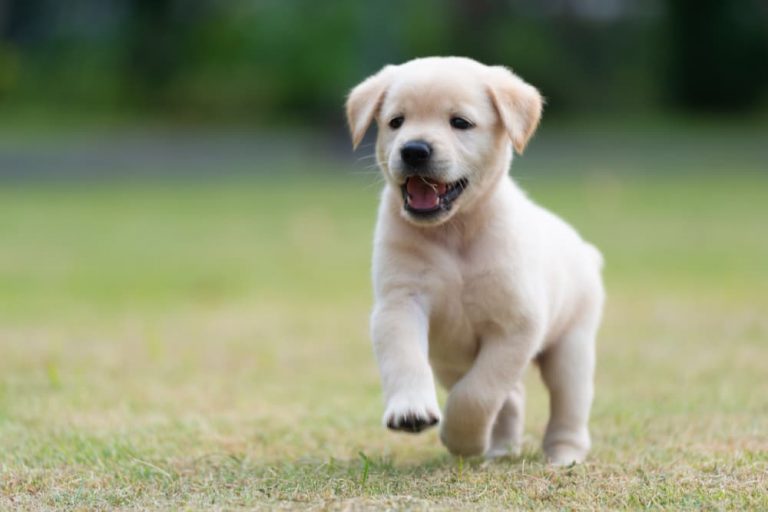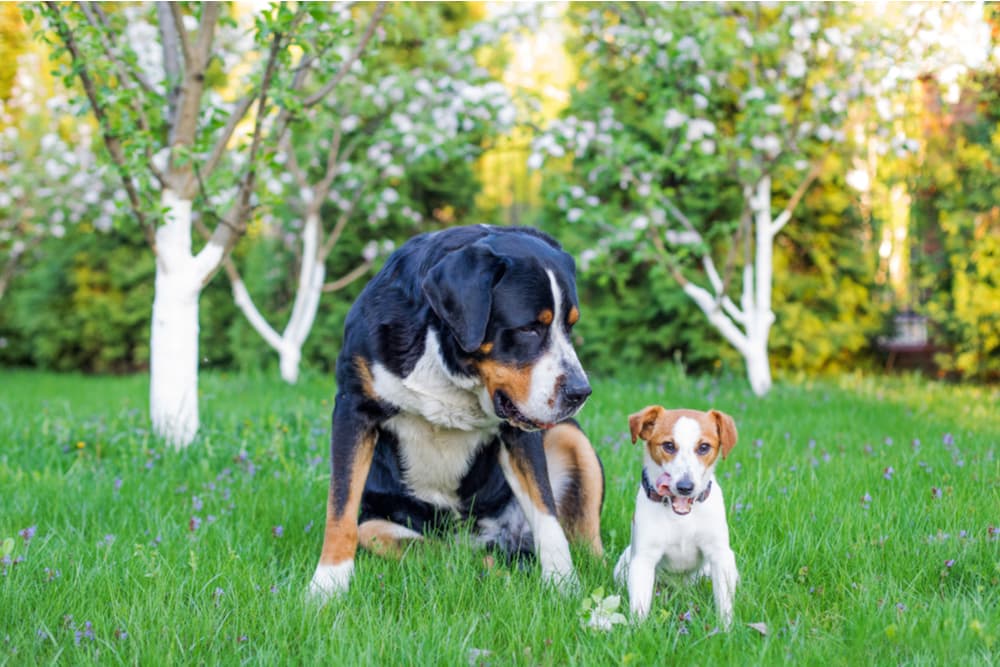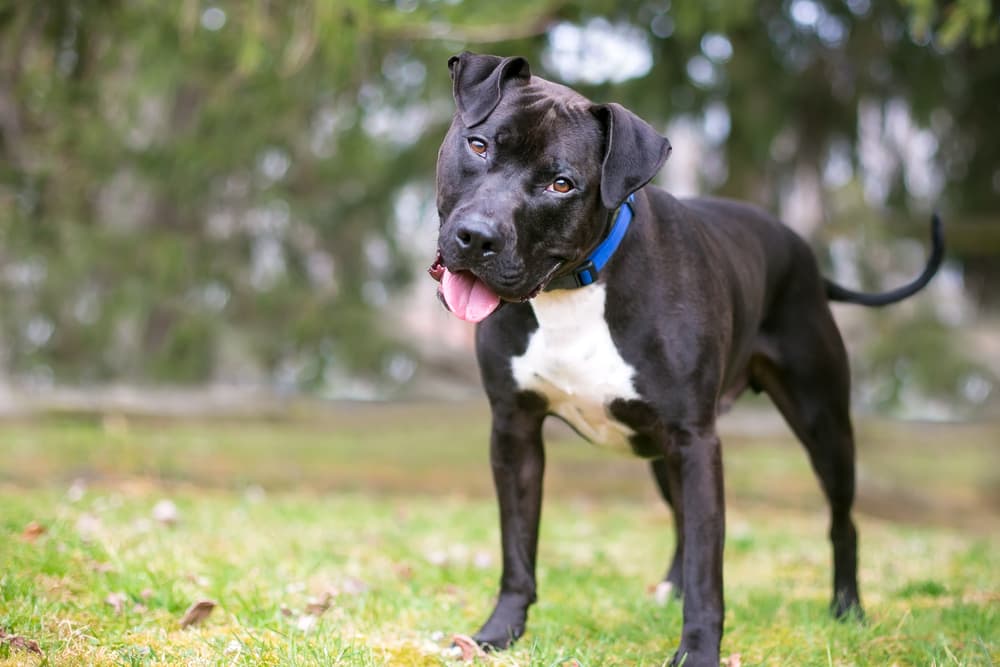When Do Dogs Stop Growing?

It can be fascinating to watch a puppy go from a tiny, blind, helpless four-legged creature to a fully-grown adult dog. It may lead you to ask the question: When do dogs stop growing?
Dog aging and growth differs from that of a human child and the common belief that one dog year is equal to seven human years isn’t quite accurate. Let’s take a look at a dog’s typical growth trajectory, when they stop growing, and how factors like breed and genetics play into the equation.
Dog Growth: An Overview

While it is obvious that dogs grow and age more quickly to humans, dog growth and development is not just a shortened version of human growth. That is why comparing 7 human years to 1 dog year is not considered an accurate representation of how dogs age.
A recent paper that analyzed the genome of over 100 Labrador Retrievers from birth through old age revealed that 1-year-old dogs are genetically much older than we previously thought. In fact, they concluded that the DNA of a 1 year old Lab is genetically equivalent to a 30 year old human, suggesting that puppies age more quickly than human children.

The research also showed that a 7-week-old puppy was similar to a 9-month-old human baby. As time passes and the dog gets older, however, the rate of aging in dogs slows down.
It is important to realize the comparison between human aging and dog aging is nonlinear and not a perfect comparison. For instance, a 1-year-old large breed dog is still growing and experiencing hormonal and body composition changes that are more comparable to an adolescent human than a 30 year old. This highlights that we still have a lot to learn about canine growth and aging.
When Do Dogs Stop Growing?

Generally, dogs stop growing between 6-18 months depending on their size and breed. Dogs are considered to be done growing when the growth plates at the ends of their bones close, meaning that the bones cannot grow any longer.
Dogs may still pack on additional fat and muscle mass after their bones are done growing, but this does not impact when a dog is considered to be full grown.
All puppies develop fairly rapidly and at the same rate until they are about 6 months of age, when differences of growth and maturation are noticed in different sized puppies. Cessation of growth in dogs is influenced heavily by a dog’s size. In general, big dogs take longer to finish growing than small dogs. This makes sense, as a Great Dane is a bigger animal than a Chihuahua, and it simply takes longer to make bigger bones in large-breed dogs.
When Do Small Dogs Stop Growing?

Small and toy breed dogs tend to stop growing around 6-8 months of age.
Small breeds are considered any dogs that have an adult weight of 30 pounds or less. This includes dogs that are as small as a 5-pound Maltese and as big as an adult 25-pound Corgi.
When Do Large Dogs Stop Growing?

Large breed dogs typically stop growing between 12-18 months of age. Between 6-8 months of age, large breed puppies have a lanky look to their bodies and are awkward and clumsy—which is frankly adorable.
Large breeds are considered any adult dogs that weigh more than 50 pounds. Large breed puppies, as already noted, grow more slowly because they have to make bigger body parts.
Growth Based on Breed

In both categories of small dogs and large dogs there is a fairly wide range of adult weights and sizes. This wider weight range will contribute to some variability between when dogs—even in the same category—finish growing.
For example, a 75-pound Labrador Retriever and a 150-pound Great Dane are both members of the large breed category. However, a Labrador will finish growing between 12-18 months of age, and a Great Dane can take upwards of 2 years to finish growing.
Furthermore, there are medium sized dogs that weigh between 30-50 pounds that don’t fit into small or large breed categories. Medium size dogs tend to mature by 12 months of age. But every breed is different, so be sure to check with your veterinarian or breeder to determine a more accurate idea of when your puppy will finish growing.
When Is a Dog Considered an Adult?

All dogs are considered to be adult dogs once they hit their one year birthday, even though large breed dogs take longer than one year to finish growing.
If you have a medium or small breed dog, your dog is considered to be an adult by the time they are one year of age. If you haven’t already transitioned your dog to adult dog food by one year of age, this is the time to do it. If you have a large or giant breed puppy, ask your veterinarian about the best time to switch from large breed puppy food to adult large breed food.
Dogs are considered adults when they have reached physical, sexual, and emotional maturity, and have gone through puberty and adolescence. Emotional maturity will result in more focused, less distractible behavior, increased consistent obedience to commands, and a more calm demeanor.
Keeping an Eye on Your Dog’s Growth: Why It’s Important

While puppies will go through growth spurts just like human children, it is important that your puppy grows at a steady, regular rate to avoid medical conditions, such as panosteitis, a painful condition that resembles growth pains in growing children. It is also important for your puppy to grow at a regular rate, not too fast or too slow, to reduce the likelihood of other developmental orthopedic disorders, including Osteochondritis dissecans (OCD) and Hypertrophic osteodystrophy (HOD).
Controlling your puppy’s rate of growth is best done under the supervision of a veterinarian, who can monitor your puppy’s growth and development, and suggest the proper nutrition and exercise specific to your dog and your family’s lifestyle.
To avoid disorders associated with rapid growth, avoid overfeeding your puppy. If you have a large breed puppy, you can further ensure joint health by feeding an appropriate amount of large breed puppy formula food, which is specifically formulated to support healthy growth and development in large breed puppies.
While it can be bittersweet to watch your puppy grow up (where does all the time go?!?), knowing when they will reach maturity and how to care for them in the meantime will contribute to a lifetime of health and wellbeing.









